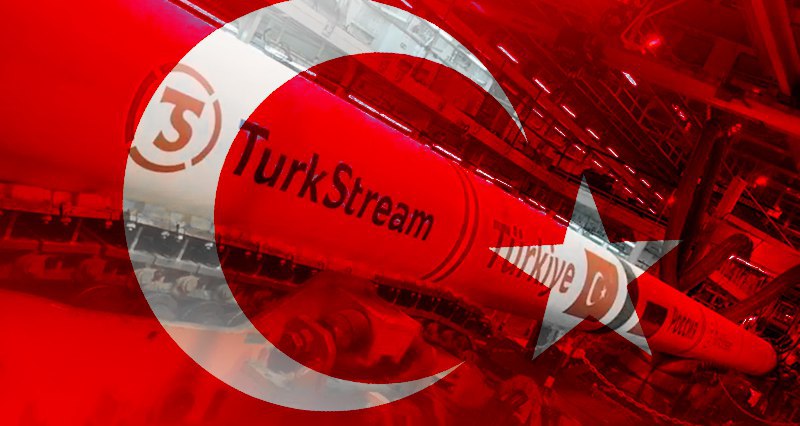Brussels aims at the last remaining working pipeline between Russia and Europe. Transit country Türkiye cautious, Greece euphoric.
Brussels aims at the last remaining working pipeline between Russia and Europe. Transit country Türkiye cautious, Greece euphoric.
An EU regulation being developed under the “REPowerEU regulation” framework now explicitly mentions TurkStream. Connecting Russia with Türkiye via 2 pipelines, TurkStream serves both domestic Turkish energy gas market and reexports to Europe.
After the transit agreement between Russia and Ukraine expired on 1 January 2025, TurkStream became the only remaining major pipeline route for Russian gas into Europe.
On October 15, EU energy ministers have agreed upon a text to limit reexports. The document states:
“The Regulation should therefore presume that natural gas imported into the Union (…) arriving via TurkStream (…) originates in or is exported, directly or indirectly, from the Russian Federation, thus replacing the requirement to submit proof of the country of production. In case it is claimed that natural gas arriving at these borders, interconnectors, or interconnection points is under a ‘transit’ procedure through the Russian Federation, strict controls should apply.”
Article 11 of the draft demands a “full prohibition” of these reexports by 7 June 2026. Under certain conditions, such as the receiving EU member being a landlocked country”, as i.e. Hungary or Slovakia, contracts has existed before June 2025, the entry into force is delayed to January 1, 2028.
Clearly, the regulation aims to prevent circumvention of bans or restrictions on Russian gas by routing through Türkiye.
The presumed Russian-origin clause means that countries importing gas via Türkiye will face higher regulatory / documentation burdens; it could trigger legal/contractual disputes if gas is re-labelled or routed indirectly.
Some EU member states (e.g., Hungary and Serbia) have publicly declared they intend to “ensure the security” of the TurkStream route, showing the pipeline’s geopolitical weight.
First Turkish reactions
Besides endangering energy safety in various countries of the Balkans, the regulation would also harm Türkiye’s ambition of becoming a regional gas hub.
Gas flowing through TurkStream into EU countries has increased in recent months, despite the broader EU aim to reduce dependence on Russian energy.
In October 2025, Energy Minister Alparslan Bayraktar said Türkiye has become “Europe’s gas lifeline” through pipelines like TurkStream and TANAP, stressing that Ankara is a “bridge between producers and consumers.”
He called for European countries to expand gas interconnection capacity and described Türkiye’s energy policy as “pragmatic and flexible”, focused on diversification and security of supply.
Meanwhile, Türkiye pursues a shift toward diversification while keeping Russian gas. A Reuters piece from 8 October 2025 described Ankara’s new energy strategy: by 2028, Turkey aims to meet over half its gas demand from domestic output and U.S. LNG, cutting reliance on Russia and Iran.
Bayraktar said: “We must source gas from all available suppliers, including Russia, Iran, and Azerbaijan.” On 3 October 2025, Bayraktar told reporters that Türkiye will keep buying Russian natural gas despite external pressures:
“We have agreements with Russia… The winter season is approaching. We cannot tell our citizens that there is no gas.” He emphasized Turkey’s balanced policy of importing from Russia, Azerbaijan, and Turkmenistan.
Data from Türkiye’s energy regulator (January–July 2025) shows Russian pipeline gas deliveries to Türkiye rose 26% year-on-year to 12.7 billion m³ — largely via TurkStream and Blue Stream.
Greece hails the regulation
On the other side of the Aegean Sea, the Greek press is celebrating the proposed regulation. Greek City Times reports that the regulation wad proposed by the Greek energy minister, aiming to “position Greece as a pivotal player in the Euro-American energy axis and reinforcing its ambition to become a regional energy hub.”
On November 6-7, Athens will host the 6th P-TEC Ministerial Conference, co-organized by Papastavrou and U.S. Energy Secretary Chris Wright.
The proposal will be presented to the European Parliament. Given the general tendency of sharpening the sanctions’ regime, its approval is likely. It will not only present new problems for East European countries regarding safe and affordable energy supply, but also place in jeopardy Turkish ambitions of becoming an international center for gas transfer and commerce – at least partly.
Substituting Russian reexports, the United States, besides other gas exporters, is likely to gain advantage. Stopping TurkStream’s operations was Washington’s long term goal, with then Secretary of State Pompeo signing an agreement on that with his Ukrainian counterparts.
















Leave a Reply